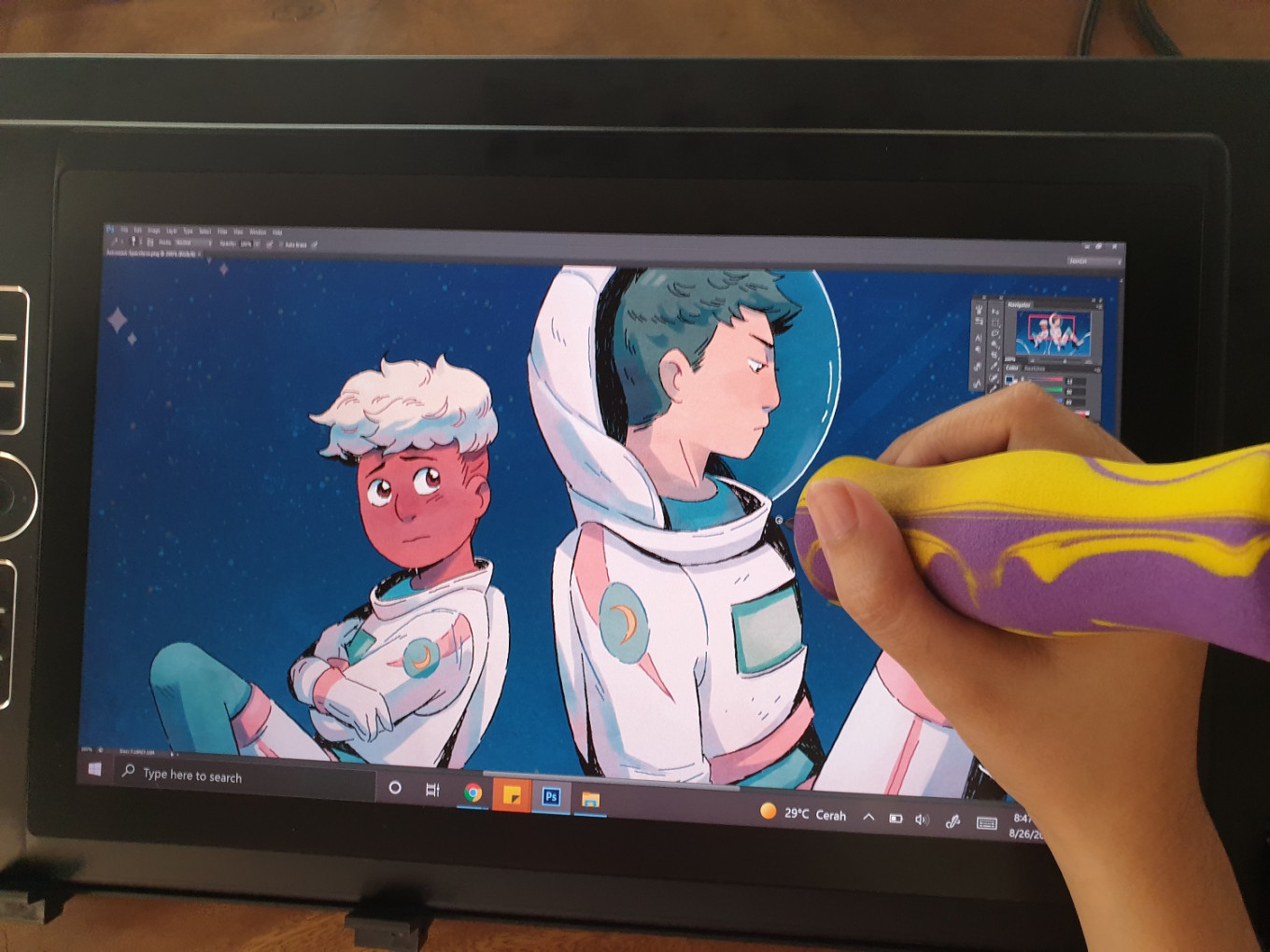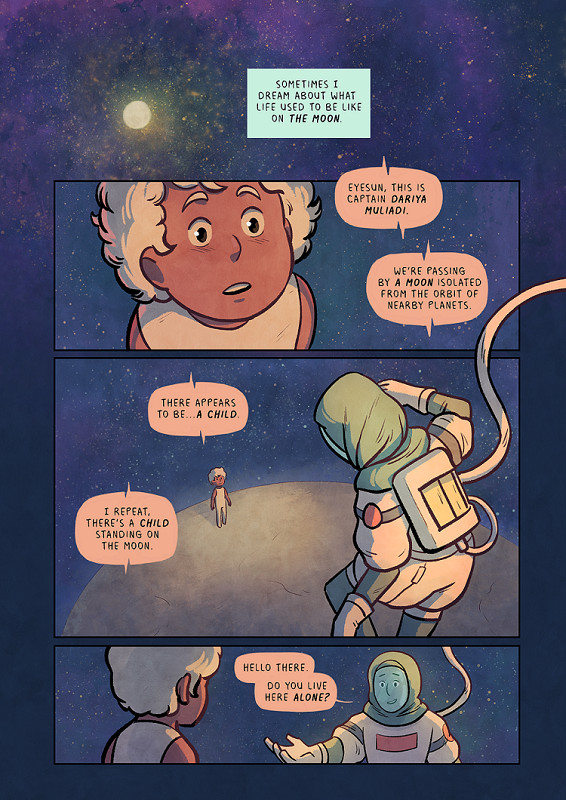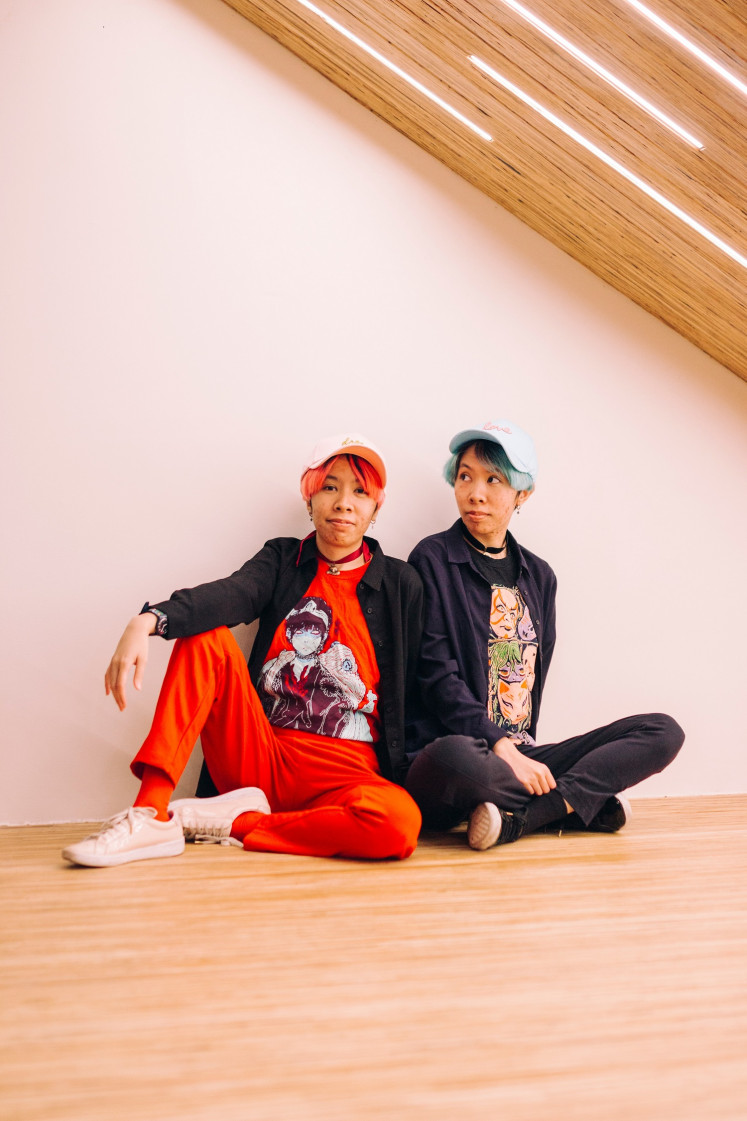'Lunar Boy': Twin artists try to represent Indonesian queer identities through comic book
Change text size
Gift Premium Articles
to Anyone

T
win artists Jessica and Jacinta Wibowo believe that exploring sexual and gender identities is something Indonesians should freely do, and is what their comic, Lunar Boy, is all about.
The exploration of one's identity other than that assigned at birth is not a widely accepted thing in Indonesia — at least in mainstream media.
The term "queer", according to the Oxford dictionary, is used to describe a sexual or gender identity that is different from traditional ideas about sex and gender.
Today, more Indonesians have spoken out about their sexual identities through various social media platforms and artworks, including these two Jakarta-based artists.
Jessica and Jacinta, or Jes & Cin, are 27-year-old writers, artists and colorists who have been drawing for as long as they can remember. Being identical twins and sharing the same profession, the only thing that sets them apart is one of them likes toast and the other is hooked on potatoes.
"Our parents always had to purchase huge stacks of paper because we drew so much. But it wasn't until we were about 13 years old that we took art more seriously. We took some casual art classes, but the two of us are largely self-taught and inspired mainly by animated movies," they said.

'Lunar Boy' is born
While at college, the twins learned about the growing graphic novel market. They had always wanted to make comics for children, and after discovering that such a dream was financially feasible, they took the first step of realizing that dream by creating Lunar Boy.
"Lunar Boy is about a young boy from the Moon named Indu, who deals with culture shock, familial struggles and first crushes when his mother marries and moves them to Earth," said the twins. "When adapting to life on Earth becomes too hard for Indu, the Moon invites him to return home. It's a coming of age story about finding community and dealing with big changes."
The 230-page comic book will be published by HarperAlley in 2023. Sample pages of the comic can already be found on the twins' Twitter and website.
Jacinta initially drew the first 15 pages of Lunar Boy as a story for a class in 2018. By 2019, Jessica had expanded and developed it into a 20-page comic with a more expansive cast and graphic novel-style pacing.
"We always loved fairytale stories but were looking to make fairytales that weren't your typical European princess, prince, witches and dragon kind of story. We gravitated toward stories like The Little Prince and Princess Kaguya, which are both about celestial beings learning what it means to be human."
"Around that time, we were also reading Dark Energy by Mathilde Kitteh, published under Peow Studios (in the Wrecked Hearts collection). We loved how it was a slice-of-life sci-fi story about love and travel. A mix of all these stories along with Shimanami Tasogare inspired Lunar Boy."
"Both of us then drew over 20 pages (the official "sample pages" for the pitch packet) again in early 2020 after the story got huge revisions from editors and our agent. So, from 2018 to early 2020, we drew over 50 pages of Lunar Boy before signing with a publisher to officially work on it as a graphic novel. It's a lot of work."
During this process, Lunar Boy changed significantly from the original pages back in 2018, both in terms of art and story. The original message and feel remain the same, but the scope of the story is bigger and more personal.

Representing Indonesian queer people
There are some characters with a religious background in the comic. Jes and Cin specifically craft these profiles to represent the diverse backgrounds that Indonesian people have.
"One of the many goals we had with Lunar Boy was to normalize non-nuclear families (a family consisting of a mother, father and their biological children). Indu is adopted by Dariya, a mother, who later marries Crisanto, a father with kids of his own."
The twins feel there is a lot of stigma around non-nuclear families, particularly around adoption, remarriage and multifaith families in Indonesia, so they wanted to represent diverse types of families positively. They also think it is important to showcase the many people of different faiths in the country.
Aside from that, the twins' most important goal is to change the stigma surrounding exploration at an early age.
"If we had to pick the biggest goal we wanted to achieve for Lunar Boy, it would be giving children the space to navigate exploring their identity. We want to encourage an open conversation about identity using queer vocabulary.
"Most of the time in children's media, queer representation is limited to metaphors or is hinted at between the lines. We wanted to have characters openly discussing with each other in a community, to show it's not an 'adult' topic or something to discuss when you're 'old enough'."
Going through obstacles
Jessica and Jacinta find direct inspiration from their friends in the queer community, aside from doing many readings. However, they have faced several challenges, mainly when contacting the Indonesian queer community.
"We did struggle with reaching out to other queer Indonesians for research and authenticity reading. We're not sure if they just didn't understand what we were doing — or what a graphic novel is — or maybe were put off by how openly we were depicting queer Indonesians in our work, but most of the people we reached out to didn't respond to us."
The two even received hate for trying to represent the queer community. Once, the twins received a hate message saying that their work was "problematic from an Indonesian point of view" and that they were not promoting good morals with their art.
"In reality, queerness has always been a part of many Indonesian cultures. It's actually western colonialism that enforced heteronormative structures around us. Although it'll take a lot of time for this country to dismantle all that violence with the added baggage of colonialism, that doesn't mean progress isn't happening in small ways."
According to the twins, more people can be inspired by the queer figures of Indonesia, such as Bunda Mayora. Those figures inspire their work, and they hope their work can inspire children in the same way. "Seeing a prominent trans woman like Bunda Mayora [Indonesia's first transgender political leader] becoming a leading figure is incredible, and the community she's fostering brings hope to a lot of young people."
In the future, the twins hope the public will also learn to be more open in accepting non-traditional identities. "What's great about being an artist is that you can show people how the world could be, not just how it is. We want to see more media that challenges how queer people are seen instead of just perpetuating it. We hope that people will look more to independent art by queer people, even if it means looking past the mainstream to find it."
ohmh









